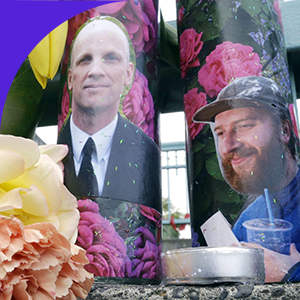Content Warning: violence
When two teenagers on a Portland train were threatened with racist, Islamophobic abuse, three of their fellow passengers stood up to protect them.
“We weren’t even supposed to be on the train that day,” Destinee Mangum would later remember in an interview.
That day was May 16, 2017. Destinee and her friend Walia Mohamed were lost, and when they boarded a Portland light rail train to get back to where they were going, a stranger began shouting at them. “Muslims should die!,” he yelled. “Go back to Saudi Arabia!”
“It’s like our faces were a trigger,” Walia said. She and Destinee are both Black, and Walia, a Muslim Somali immigrant, was wearing a hijab. The two teenagers were terrified, and the man’s abuse began to escalate.
“I’m just trying to live life,” said Destinee, who recognized that the stranger focused his hatred toward her and Walia “because of our religion or because of our color.” Through his hateful tirade and threatening demeanor, Destinee received the message that this man she had never met believed “that we don’t deserve to be here and we don’t deserve to live.”
“While he yelled, he was staring right at us,” Destinee explained. “His eyes were blank.” The teenagers fled to the back of the train as the yelling became louder and more aggressive. “That’s when Ricky, Taliesin, and Micah stepped in.”
Twenty-three-year-old Taliesin Namkai-Meche took out his cell phone and began recording, showing the attacker that he was being filmed. When the man moved closer, threatening Taliesin, twenty-one-year-old Micah Fletcher stood with Taliesin. Micah told the attacker to get off the train. Instead, the attacker pulled out a knife. He lunged at them, stabbing Taliesin and Micah, both in the neck. When fifty-three-year-old Ricky John Best tried to intervene, the attacker stabbed him, too.
Taliesin, Micah, and Ricky didn’t know each other or the teenagers they were defending. “They just wanted to help,” Walia said later. These three men, in fact, were known for standing up and showing up, motivated by a sense of responsibility and love for others. Their courage may very well have saved Destinee’s and Walia’s lives that day.
Though critically injured, Micah survived and recovered from his wounds. Tragically, Ricky and Taliesin died that day despite the efforts of multiple passengers who came to their aid, trying to stem the bleeding. Other passengers followed the attacker when he fled from the station to ensure that Portland police could locate him and take him into custody.
When the attacker went on trial, evidence showed that he had long-held allegiances to hate groups and ideologies. Walia and Destinee were not the first victims of his threats and abuse; he’d exhibited violent racist behavior toward another woman just the week before. Because of Micah, Ricky, and Taliesin, the attacker was caught and sentenced to life in prison.
In the days after the attack, the families of these three courageous men shared details about them, illustrating how love and responsibility shaped their actions.
Ricky, a Portland city official and a father of four, had retired from the U.S. Army only a few years earlier after more than two decades of service. His family said standing up for strangers was part of his character.
Taliesin was a recent Reed College graduate. At a memorial vigil for Taliesin and Ricky, Taliesin’s mother spoke about the loving son that she had lost to hatred. “His heart was [as] big as the world,” she said. Taliesin’s sister penned a beautiful tribute to her brother, sharing how her “heart feels empty from the loss of [her] big brother, but also from the cruel awakening that hate and judgment can cause someone to do such a thing.” She went on to say: “I am so proud to be able to call someone so brave and strong my big brother. You have always and will always be my hero.”
Micah, a student at Portland State University, was on his way to his job at a pizza shop before the attack. While he sat wounded on the train platform, not knowing whether he would survive, a stranger helped him call his mom. Micah asked her to call his boss and let them know he couldn’t make it into work that day. “Then I told her I loved her,” Micah said later in court, “and that I’d see her soon.”
Like Taliesin and Ricky, Micah was known as a person who made a habit of standing up for what’s right and supporting others in the face of hate. Micah’s mother, Margie Fletcher, said her son has intervened for others before. “Micah’s always done that. I’m proud of him for standing up. I’m grateful that he’s here. It’s hard for me to say I want people to stand up, but two girls might be alive because of them.”
Micah remained incredibly humble despite floods of public praise. In a video he posted to Facebook, Micah said all this attention shouldn’t be directed at him. It was Walia and Destinee, he said, who “need to be reminded that this is about them…they are the real victims here.”
But Destinee’s mother, Dyjuana, still sees Micah as “one of the angels that saved my daughter’s life.” Destinee and her mother had the chance to meet Micah in June of 2017. The two young survivors held each other tight. Destinee brought a gift for Micah, a t-shirt that she had made for him: “I love you and you are my hero,” it reads.
In the years since, the walls of the Hollywood Transit Center, where the attack ended, have been transformed into a memorial mural. The mural shows sunset changing into night, with eight lines of poetry, each in a different language—including Somali, in Walia’s honor. Written in gold on the darkest walls are words commemorating the spirit of the men who stood up that day: “We choose love.”


